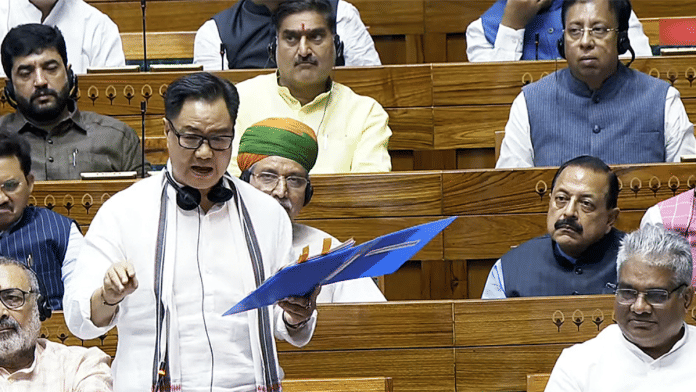New Delhi: The Narendra Modi government is under attack from opposition parties and a section of the Muslim community for introducing the Waqf (Amendment) Bill, 2024, but one of its key provisions — a centralised system of registration of waqf properties — is prevalent in many Muslim-majority countries.
Union Minister of Parliamentary Affairs of India Kiren Rijiju presented the bill in the Lok Sabha last week. The bill proposed 44 amendments to streamline the registration and management of waqf properties. Key changes are mandating waqf deeds for establishing waqf properties, creating a centralised registration system, and granting district collectors the authority to survey waqf properties.
The government also proposed to remove a provision that the Congress-led United Progressive Alliance government introduced in 2013, allowing anyone to donate property to establish a waqf. Under the bill, only Muslims, who have been “practising Islam for at least five years”, are eligible to create a waqf.
The opposition parties and a section of the Muslim community have called the proposed changes “unconstitutional”, “draconian”, and “divisive”, adding that the government is attempting to undermine waqf boards by introducing a system they have described as “Collector Raj”.
However, Muslim-majority Bangladesh, United Arab Emirates (UAE), Indonesia, Turkey, Kuwait, Lebanon, and Saudi Arabia, as well as Singapore, have a centralised system of registration of waqf properties.
ThePrint explains the laws governing the management of waqf properties in other countries.
Waqf management in Pakistan and Bangladesh
While India and Pakistan are among the few countries following the decentralised model for registering waqf properties, Bangladesh has a centralised system.
In Pakistan, the administration and management of waqf properties fall under different authorities in Islamabad and provincial governments. A waqf Act, enacted separately for Islamabad (The Islamabad Capital Territory Waqf Properties Act, 2020) and every other province in September 2020, mandates appointing a government official under the law as chief administrator to oversee all aspects of waqf management.
In contrast, the religious affairs ministry controls the waqf administration in Bangladesh under the Waqfs Ordinance, 1962 — an East Pakistan ordinance from when Bangladesh was a part of Pakistan — which remained in force after the country’s independence in 1971. The ordinance, along with the Waqf (Transfer and Development of Property) Special Provisions Act, 2013, regulates the creation and management of waqf properties.
In Bangladesh, the administrator, appointed by the ministry for a five-year term, is supported by a committee. All waqf properties have to be registered with the office of the waqf administrator, according to a research paper in the Global Waqf Conference series — Waqf: Past, Present and Future of Waqf — by the International Islamic University Malaysia.
An article by Dr Mohammed Obaidullah, published in the International Journal of Not-for-Profit Law in February 2016, said, “India, Pakistan, and Bangladesh share a common history of being part of the undivided India ruled by the British until 1947; therefore, they show striking similarities in their waqf laws.”
Centralised system of waqf in most countries
Indonesia, Turkey, Kuwait, Lebanon, and Saudi Arabia, among others, have a centralised system, too.
In Indonesia, a central body set up in 2007 — Badan Wakaf Indonesia (BWI) — guides waqf asset managers to use assets effectively for the greater benefit of the community. BWI has the power to appoint waqf asset managers and plan the development of waqf properties. It also advises the government on policy matters related to endowments, according to the information available on the BWI portal.
In Kuwait, the waqf and Islamic affairs ministry manages and distributes waqf revenue for charitable purposes, while in Saudi Arabia, a General Authority of Waqf (GAA), linked to the Prime Minister, manages waqf properties and development.
In Singapore, one of the most religiously diverse nations with nearly a 15.6 percent Muslim population, the waqf management is governed by the Administration of Muslim Law Act (AMLA). The Majlis Ugama Islam Singapura (Muis), a statutory body constituted under the law, oversees all waqf properties. The Council of Muis has members appointed by the government and makes policies and operational plans.
The two distinct categories of waqf assets in the Muis portal are properties and cash. The properties include commercial spaces, residential units, mosques, madrasas, etc.
In the bill, the Modi government has proposed that only a Muslim practising Islam for at least five years can give his property for waqf. On similar lines, only a Muslim can donate property for waqf in Singapore, according to the Administration of Muslim Law Act.
(Edited by Madhurita Goswami)
Also read: Waqf Bill 2024 finally recognises ‘minority’ doesn’t mean Muslim, Sunni, male






